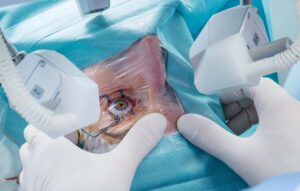The Potential Benefits of Having Refractive Eye Surgery to Improve Your Vision
It is estimated that over 164 million adults in the United States require some form of vision correction on a daily basis in order to see effectively. You are not alone in experiencing vision problems if you are one of the numerous people who struggle with fuzzy or blurry vision.
One of the most frequent types of eye problems that might impair your ability to see well without the use of corrective lenses is a refractive error. The following are some of the most prevalent types of refractive errors:
- Myopia refers to a condition in which a person has difficulty seeing things that are further away.
- Hyperopia refers to a condition in which a person has difficulty seeing things that are up close.
- Astigmatism is a form of vision distortion that can occur at any distance and is caused by an uneven corneal curvature.

After receiving permission from the FDA in 1999, traditional LASIK laser eye surgery quickly became one of the most common and widely used long-term options for correcting various types of refractive problems. However, LASIK surgery is not appropriate for everyone, and patients who suffer from refractive problems may not necessarily be candidates for this life-altering operation.
Even though LASIK has been shown to be a reliably painless treatment for correcting poor vision, the concept of reshaping the cornea can feel too invasive for some people who are considering getting the procedure. LASIK may not be an option for people who suffer from conditions such as chronic dry eye syndrome, big pupils, thin corneas, and a number of additional problems. Talking to a reputable and skilled eye surgeon who specialises in refractive eye operations such as LASIK is the first thing you should do if you want to find out how to correct the refractive error you have in your eyes.
There Are Three Options Available Apart than LASIK Eye Surgery
Our patients come to Personal Eyes because our board-certified ophthalmologists are experts in providing them with the most cutting-edge laser vision correction technology that is currently available. Together, we will search for the method of vision correction that will satisfy your requirements as an individual to the greatest extent possible.
This information is for you if your ophthalmologist has informed you that you are not a candidate for LASIK eye surgery, or if you are interested in learning about various types of refractive surgical possibilities. Continue reading to find out more information on the alternatives to LASIK surgery that are offered at Personal Eyes.
PRK Laser Eye Surgery
The term “first generation” of laser vision correction is commonly used to refer to the procedure known as photorefractive keratectomy or PRK. The most prevalent types of refractive defects, including astigmatism, are treatable with PRK. Patients who have corneas that are too thin may not be ideal candidates for LASIK eye surgery, but they may be excellent candidates for PRK treatment.
Your cornea will be reshaped using a cutting-edge excimer laser during the PRK process that your eye surgeon will perform on you. During this operation, your cornea’s outermost layer of tissue will be totally removed. After your procedure, the corneal layer will eventually regenerate on its own over the course of the subsequent few days.

Patients who undergo PRK are likely to have a lengthier recovery period than other patients because the cells on the cornea’s outermost layer require some time to regrow after the procedure. Patients are often instructed not to operate a motor vehicle for up to a week after receiving treatment, and it can take anywhere from two to six weeks before they begin to enjoy clear vision.
ZEISS SMILE Laser Eye Surgery
The ZEISS SMILE eye surgery, also known as the Small Incision Lenticule Extraction method, is one of the most cutting-edge laser eye treatments now available for the correction of refractive defects. When compared to other types of refractive surgery, the ZEISS SMILE procedure is far less invasive.
LASIK is a surgical process that involves your ophthalmologist creating a corneal flap in order to access your cornea. In contrast, the ZEISS SMILE technique does not include the creation of any corneal flaps.
In order to effectively reshape your cornea, your LASIK eye surgeon will make a tiny hole measuring three millimeters in diameter in the layer of the cornea that covers the front of your eye. This may result in substantially shorter periods of time needed for recovery, as well as fewer adverse side effects and less discomfort.
Refractive Implant Surgery Using the Visian ICL

The Implantable Collamer Lens, also known as the Visian ICL, is a refractive implant that can correct common types of refractive defects and even improve one’s ability to see at night. The Visian ICL procedure differs from conventional laser eye treatment and vision correction surgeries in that it does not involve the removal of any corneal tissue. Instead, it makes use of additive technologies.
The majority of laser refractive operations are intended to correct your eyesight by reshaping your cornea to reflect light more properly. This is done in order to improve your vision. Through a minute incision made in the cornea, your ophthalmologist will insert a lens into your eye that will correct your vision as part of the Visian ICL procedure.
Patients who do not meet the requirements for LASIK surgery or who do not prefer to undergo a more invasive operation may be candidates for this approach, which has proven to be an excellent option.
Refractive implants such as the Visian ICL are known for their comfort and discretion, as well as their ability to restore patients’ vision immediately and facilitate a speedy recovery. Visian lenses can also be removed in the event that this becomes necessary in the future.
At Personal Eyes, you can get a free consultation to find out which corrective eye surgery will work best for your individual requirements.
At Personal Eyes, we are committed to providing patients with care of the greatest possible quality and to assisting them in achieving the clearest vision they are capable of. With the help of our cutting-edge technology and methods for refractive laser eye treatment, we are able to design a bespoke treatment strategy that is tailored to address your specific visual issues.
Conclusion
Personal Eyes’ mission is to provide information to everyone interested in learning how to better their eyesight. And if you are seriously considering laser vision correction, you need first ensure that you are a suitable candidate.
If you are having any questions or inquiries about how to have a correct vision, Laser eye surgery procedure, Corneal tissue problems, Lasik surgery, a laser beam in the healing process, excimer laser usage, refractive error, laser treatment, glasses or contact lenses, blurred vision, contact sports, the surgical procedure for refractive surgery or Lasik laser eye surgery – you should get in touch with us via our Personal Eyes website to book your free assessment today.



